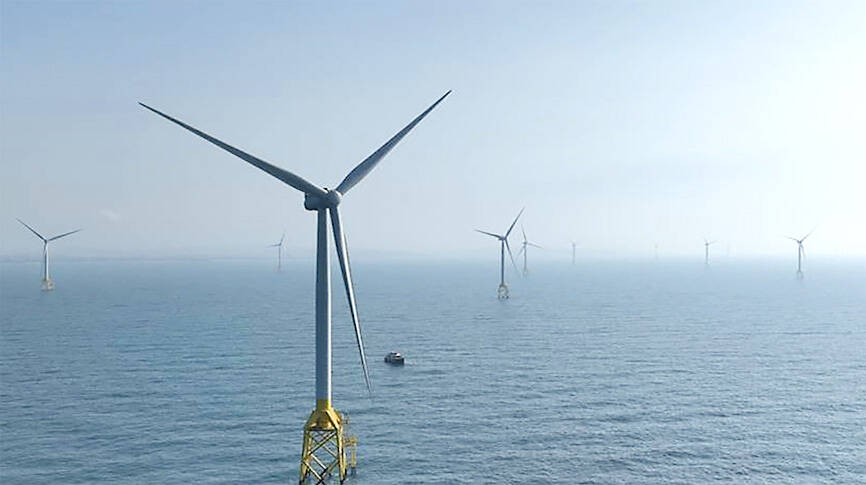Synera Renewable Energy Group (SRE, 風睿能源), a Taiwan-based offshore wind developer, is in talks over potential deals across Asia as it seeks to diversify beyond its home market.
The firm is holding discussions over acquisitions and investments with companies in South Korea, Japan and Australia, chief executive officer Anna Su (蘇容儀) said in an interview.
SRE is already involved in projects in Japan and will consider expanding into Southeast Asia next year, she said.

Photo: CNA
The move to diversify geographically comes as offshore wind projects globally struggle with the after-effects of the COVID-19 pandemic, including higher interest rates and surging inflation. In Taiwan, requirements that developers buy 60 percent of their equipment from local manufacturers have also pushed up costs. Japanese companies have been pulling out of projects in Taiwan.
Globally, costs in the offshore wind industry have risen about 50 percent on average this year, and this will continue to be a challenge, Su said.
Taiwan’s local content requirements make wind energy relatively more expensive, and many companies are unwilling to pay extra when electricity prices are heavily subsidized by the government, she said.
“You want green energy, but green energy does not come free,” Su said.
SRE is also “continuously watching” the Taiwan-China geopolitical situation, she said.
Su said she was still optimistic about wind power in Taiwan, particularly due to demand from the semiconductor chip industry, which could absorb about 6 gigawatts of capacity alone.
“Taiwan made a good decision to join the offshore wind industry early,” she said.

Taiwan Semiconductor Manufacturing Co (TSMC, 台積電) yesterday said that its investment plan in Arizona is going according to schedule, following a local media report claiming that the company is planning to break ground on its third wafer fab in the US in June. In a statement, TSMC said it does not comment on market speculation, but that its investments in Arizona are proceeding well. TSMC is investing more than US$65 billion in Arizona to build three advanced wafer fabs. The first one has started production using the 4-nanometer (nm) process, while the second one would start mass production using the

When an apartment comes up for rent in Germany’s big cities, hundreds of prospective tenants often queue down the street to view it, but the acute shortage of affordable housing is getting scant attention ahead of today’s snap general election. “Housing is one of the main problems for people, but nobody talks about it, nobody takes it seriously,” said Andreas Ibel, president of Build Europe, an association representing housing developers. Migration and the sluggish economy top the list of voters’ concerns, but analysts say housing policy fails to break through as returns on investment take time to register, making the

‘SILVER LINING’: Although the news caused TSMC to fall on the local market, an analyst said that as tariffs are not set to go into effect until April, there is still time for negotiations US President Donald Trump on Tuesday said that he would likely impose tariffs on semiconductor, automobile and pharmaceutical imports of about 25 percent, with an announcement coming as soon as April 2 in a move that would represent a dramatic widening of the US leader’s trade war. “I probably will tell you that on April 2, but it’ll be in the neighborhood of 25 percent,” Trump told reporters at his Mar-a-Lago club when asked about his plan for auto tariffs. Asked about similar levies on pharmaceutical drugs and semiconductors, the president said that “it’ll be 25 percent and higher, and it’ll

CHIP BOOM: Revenue for the semiconductor industry is set to reach US$1 trillion by 2032, opening up opportunities for the chip pacakging and testing company, it said ASE Technology Holding Co (日月光投控), the world’s largest provider of outsourced semiconductor assembly and test (OSAT) services, yesterday launched a new advanced manufacturing facility in Penang, Malaysia, aiming to meet growing demand for emerging technologies such as generative artificial intelligence (AI) applications. The US$300 million facility is a critical step in expanding ASE’s global footprint, offering an alternative for customers from the US, Europe, Japan, South Korea and China to assemble and test chips outside of Taiwan amid efforts to diversify supply chains. The plant, the company’s fifth in Malaysia, is part of a strategic expansion plan that would more than triple